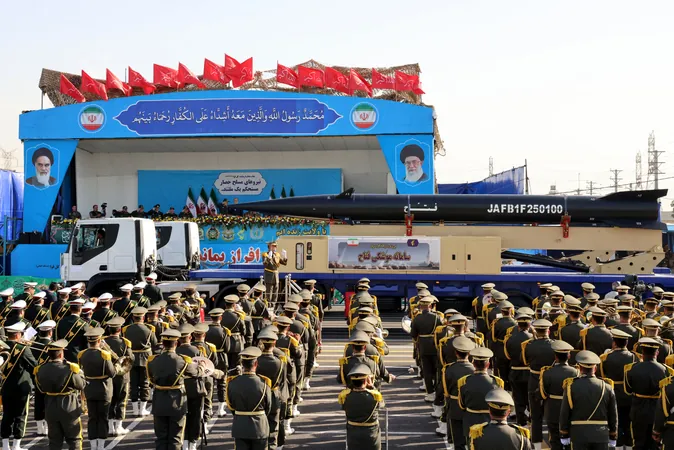
Iran Prepares for Potential Israeli Aggression: A Conflict That Could Reshape the Middle East
2024-10-03
Iran Prepares for Potential Israeli Aggression: A Conflict That Could Reshape the Middle East
In a recent surge of hostilities, Iran is bracing itself for a possible retaliatory strike from Israel, following a dramatic missile attack that saw Tehran launch around 200 missiles at its long-time rival. This escalated tension comes on the heels of Israel's involvement in several high-profile assassinations, including key figures from Hamas and Hezbollah, that have amplified fears of an all-out war in the region.
Israeli Prime Minister Benjamin Netanyahu has issued a stark warning, claiming that Iran will "pay" for its actions. The geopolitical landscape is already fraught with instability, as conflicts continue to simmer between Israel and forces in both Gaza and Lebanon. Analysts suggest that Israel's military response could focus on Iranian military installations, energy facilities, and nuclear sites, with implications that could dramatically alter the regional order.
Alireza Taghavinia, a Tehran-based security expert, notes that Iran's reaction will largely hinge on the scale of any Israeli attacks. The Iranian leadership has indicated a determination to respond decisively to perceived aggressions against its territory. "Iran will not tolerate any attack on its land," Taghavinia warns, emphasizing that even symbolic actions could provoke a serious escalation.
The Nuclear Question
While Ayatollah Ali Khamenei, Iran's supreme leader, historically opposed nuclear armament, ongoing tensions and military threats may shift this stance. Following the collapse of the Joint Comprehensive Plan of Action (JCPOA) in 2019 under President Donald Trump, Iran has accelerated its uranium enrichment activities. The Biden administration asserts that all options remain open for preventing Iran from acquiring nuclear weapons, even as Israeli officials indicate a preference for preemptive strikes.
Military analysts highlight that Israel faces significant challenges if it chooses to target Iran's fortified nuclear sites. Taghavinia warns that a direct assault could lead to substantial risks for Israeli pilots and potentially result in their capture. Moreover, both Taghavinia and fellow analyst Amir Hossein Vazirian suggest that Iran is likely to ramp up its nuclear activities in response to any military aggression by Israel.
Escalating Tensions and Economic Warfare
Contrary to focusing solely on military targets, Israeli strategies could extend to Iran's extensive missile arsenal and vital economic infrastructure. Iran's missile assets are reportedly concealed within underground complexes, designed to withstand direct assaults. However, Vazirian points out that key sites remain relatively exposed and could be targeted, resulting in reciprocal strikes against Israel's own infrastructure, including its oil and gas sectors.
The stakes rise higher when considering potential U.S. involvement. Any Israeli strike, particularly if coupled with American support, could incite Iran to retaliate against U.S. interests in the region. There’s a looming threat of disruption to global oil supply chains, notably through the strategic Strait of Hormuz, which is crucial for international shipping and energy transport.
Iran’s alliances with groups like the Houthis in Yemen and various militia factions in Iraq may further amplify retaliatory responses, potentially dragging the U.S. deeper into the conflict.
The Perception of War
The current situation can be viewed through the lens of historical conflicts, notably the Iran-Iraq war, where external forces were heavily involved, reshaping regional dynamics. The potential for a new "battle of infrastructure" poses profound risks, not only for Iran and Israel but for the broader geopolitical landscape as well.
In a sobering reflection, Mostafa Najafi, an expert on Middle Eastern geopolitics, warns that any military confrontation with Iran differs fundamentally from previous conflicts, asserting "Iran is neither Iraq nor Afghanistan." The implications of an escalating confrontation, he suggests, could reverberate throughout global economies, particularly in oil markets.
As tensions mount, Israel is keen on altering the realities on the ground before the upcoming U.S. elections, with stakeholders on both sides weighing their next moves. The international community watches closely, aware that miscalculations could have catastrophic consequences, not just for the Middle East, but for global stability as well.
With strategic calculations at stake and both nations poised for action, the coming days will be critical in determining whether this military escalation leads to an unprecedented conflict that reshapes the region for generations.
 Brasil (PT)
Brasil (PT)
 Canada (EN)
Canada (EN)
 Chile (ES)
Chile (ES)
 España (ES)
España (ES)
 France (FR)
France (FR)
 Hong Kong (EN)
Hong Kong (EN)
 Italia (IT)
Italia (IT)
 日本 (JA)
日本 (JA)
 Magyarország (HU)
Magyarország (HU)
 Norge (NO)
Norge (NO)
 Polska (PL)
Polska (PL)
 Schweiz (DE)
Schweiz (DE)
 Singapore (EN)
Singapore (EN)
 Sverige (SV)
Sverige (SV)
 Suomi (FI)
Suomi (FI)
 Türkiye (TR)
Türkiye (TR)